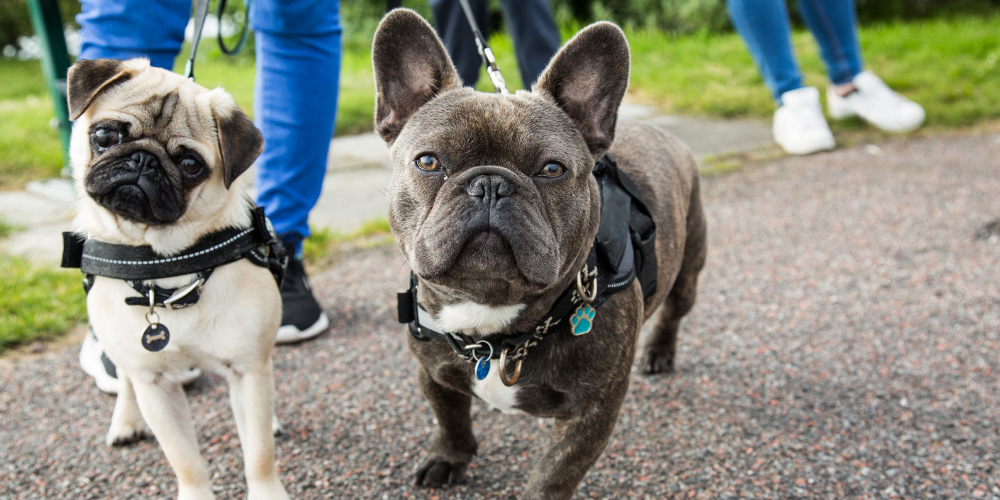No pet owner likes to watch their dog suffer from allergies. In many cases, it’s hard to diagnose what’s exactly wrong and how to fix it. Just like humans, most dogs that suffer from allergies will continue to do so their entire lives.
Luckily, there are certain signs and symptoms that indicate what’s causing your pup’s discomfort. Finding the best remedy will help keep your furry friend happy and their symptoms at bay!
Types of Allergies

In dogs and humans, allergies are the immune system’s reaction to foreign substances. Unfortunately, allergies in dogs are quite common and can manifest in several different ways depending on the type of allergy they suffer from.
Skin Allergies
Also called allergic dermatitis, skin allergies are the most common type of allergic reaction in dogs. They can be caused by three different factors:
- Fleas
- Food Allergies
- Environmental Allergens
Fleabites can often cause an allergic reaction called flea allergy dermatitis. This is because some dogs are allergic to flea saliva and can develop itchy, red, swollen bumps on their skin. Look out for flea dirt or fleas themselves to make sure your dog isn’t suffering from flea allergy dermatitis.
Food allergies are another type of allergy that can manifest in the form of itchy skin. When skin allergies are caused by food, they’ll likely itch their ears and paws often.
Environmental allergens are a huge cause of skin allergies as well. Allergens like dust, pollen, and mold can sit on fur and irritate the skin to the point of itchiness.
Environmental Allergies
Environmental allergies, or atopic dermatitis, are usually seasonal allergies that occur when allergens are more active in the air. Like humans, dogs are commonly allergic to pollen and dust. Exposure to these allergens can cause itchiness of the skin and even respiratory issues like coughing, sneezing, or wheezing.
Food Allergies
While food allergies aren’t as common as the other causes, they can be incredibly inconvenient to the dog and owner. Make sure not to get food allergies confused with a food intolerance. Food sensitivity, which is when dogs have a gradual reaction to foods, is much different than food allergies, which cause an immediate immune response.
Dogs with food allergies can experience digestive issues like vomiting or diarrhea, or skin problems like dryness, itchiness, and even infection. Food allergies can be pretty serious—we suggest you talk with your veterinarian to figure out the best solution.
Common Symptoms

Dogs’ allergy symptoms vary greatly from case to case, but there are several common signs that we’ve found in dogs suffering from allergies. Symptoms can include:
- Itchiness
- Hives
- Swelling of the face, ears, lips, eyelids, or earflaps
- Redness, inflamed skin
- Diarrhea
- Vomiting
- Sneezing
- Itchy ears
- Chronic ear infections
- Itchy, runny eyes and nose
- Constant licking of paws
Treatment Options

Treatment can vary depending on the severity of the allergies, but there are certain steps that will likely alleviate the symptoms. These include:
Hypoallergenic Shampoo
If your dog struggles with itchy and irritated skin, there may be something in the air that’s getting trapped in their fur and affecting their skin. Try buying a gentle, hypoallergenic shampoo and giving them a bath. If this helps alleviate their allergies, continue to bathe them every month to prevent pollen or allergen build-up in their fur.
Anti-Inflammatories
If your dog’s allergies are persistent, you may need to give them a vet prescribed anti-inflammatory medication. These medications quickly block the allergic reactions in most dogs and can be taken in chew form or long-acting injections. While they may be effective, they can have some undesirable side effects—talk with your veterinarian to determine if anti-inflammatories are appropriate for treating your dog’s allergies.
Special Diet
If food allergies are causing your dog’s symptoms, you’ll need to switch them over to a specialty diet. Food allergies typically develop in response to the protein in dairy products, beef, wheat gluten, chicken, eggs, lamb, or soy. Since food allergies don’t usually respond well to anti-inflammatory medication, you’ll need a more natural method to alleviate their symptoms. The most effective way to test for food allergies is by using an elimination diet, but generally avoiding common allergens is a good start.
Allergy Supplements
Regardless of the type of allergies your dog suffers from, a natural allergy supplement is a great way to alleviate their allergies without worrying about unwanted side effects. The PupGrade Itch & Allergy Chew is formulated to alleviate your dog’s seasonal, skin-related, dietary, or environmental allergies while boosting their immune and digestive health.
Allergy chews are a healthy option for treating general allergies without using expensive medications that may cause drowsiness and other unwanted side effects. On top of that, the Itch & Allergy Chew by PupGrade includes ingredients to improve skin and coat health and boost the immune system to defend against allergens, bacteria, and viruses. Click here to heal your pup from the inside out!
We've gone ahead and enclosed a 10% OFF Coupon below for you to use in the store - remember, your puppy DESERVES to have the healthiest life! Click here to start shopping!








Comments (0)